Common Misconceptions Regarding Criminal Protection: Debunking Misconceptions
Common Misconceptions Regarding Criminal Protection: Debunking Misconceptions
Blog Article
Short Article By-Connell Dixon
You have actually most likely listened to the myth that if you're charged with a crime, you must be guilty, or that remaining quiet ways you're hiding something. These widespread beliefs not only misshape public perception but can also influence the outcomes of lawful procedures. It's important to peel back the layers of false impression to comprehend real nature of criminal protection and the rights it safeguards. What happens if you recognized that these myths could be dismantling the really structures of justice? Sign up with the conversation and explore just how exposing these myths is vital for guaranteeing fairness in our lawful system.
Misconception: All Offenders Are Guilty
Commonly, people mistakenly think that if a person is charged with a criminal activity, they should be guilty. You might assume that the lawful system is infallible, yet that's much from the reality. Fees can stem from misunderstandings, mistaken identifications, or not enough evidence. It's important to keep in mind that in the eyes of the legislation, you're innocent up until tested guilty.
This assumption of innocence is the bedrock of the criminal justice system. It makes sure that the burden of proof lies with the prosecution, not you. They need to establish beyond a reasonable uncertainty that you committed the criminal activity. This high conventional protects people from wrongful convictions, making sure that no person is punished based upon assumptions or weak proof.
Furthermore, being billed doesn't mean the end of the road for you. You deserve to defend on your own in court. This is where a competent defense attorney enters into play. They can test the prosecution's instance, existing counter-evidence, and advocate on your behalf.
The complexity of legal procedures commonly requires skilled navigation to safeguard your rights and accomplish a fair result.
Misconception: Silence Equals Admission
Several think that if you select to stay silent when charged of a criminal offense, you're basically admitting guilt. Nonetheless, this couldn't be better from the fact. Your right to stay silent is secured under the Fifth Change to stay clear of self-incrimination. It's a lawful safeguard, not a sign of sense of guilt.
When cyber crime defense , you're really exercising a fundamental right. This prevents you from stating something that may accidentally harm your protection. Remember, in the warmth of the minute, it's very easy to obtain confused or speak erroneously. Law enforcement can analyze your words in ways you didn't plan.
By staying quiet, you provide your attorney the best possibility to defend you successfully, without the issue of misinterpreted declarations.
Additionally, it's the prosecution's work to verify you're guilty beyond a practical doubt. Your silence can not be utilized as proof of sense of guilt. As a matter of fact, jurors are instructed not to analyze silence as an admission of sense of guilt.
Myth: Public Protectors Are Inadequate
The mistaken belief that public defenders are ineffective lingers, yet it's critical to understand their critical duty in the justice system. Several believe that because public protectors are commonly strained with instances, they can't provide quality defense. Nevertheless, this forgets the deepness of their dedication and knowledge.
Public protectors are completely accredited attorneys that've selected to specialize in criminal regulation. They're as certified as private legal representatives and usually much more seasoned in test job due to the quantity of cases they deal with. You may assume they're much less determined because they do not choose their clients, however in reality, they're deeply committed to the perfects of justice and equal rights.
It is essential to bear in mind that all attorneys, whether public or private, face challenges and constraints. Public defenders often deal with fewer resources and under more pressure. Yet, they consistently show durability and creative thinking in their defense strategies.
Their duty isn't simply a task; it's a goal to make certain that every person, no matter earnings, obtains a reasonable trial.
Final thought
You could think if somebody's charged, they should be guilty, yet that's not exactly how our system works. Choosing to stay https://kvia.com/news/2022/10/12/how-jake-tapper-started-investigating-the-conviction-of-one-of-his-fathers-patients-in-south-philadelphia-2/ mean you're confessing anything; it's just clever self-defense. And don't undervalue public protectors; they're devoted experts devoted to justice. Keep in mind, everyone is entitled to a reasonable test and proficient depiction-- these are fundamental rights. Allow's shed these misconceptions and see the legal system of what it truly is: an area where justice is sought, not just punishment gave.
